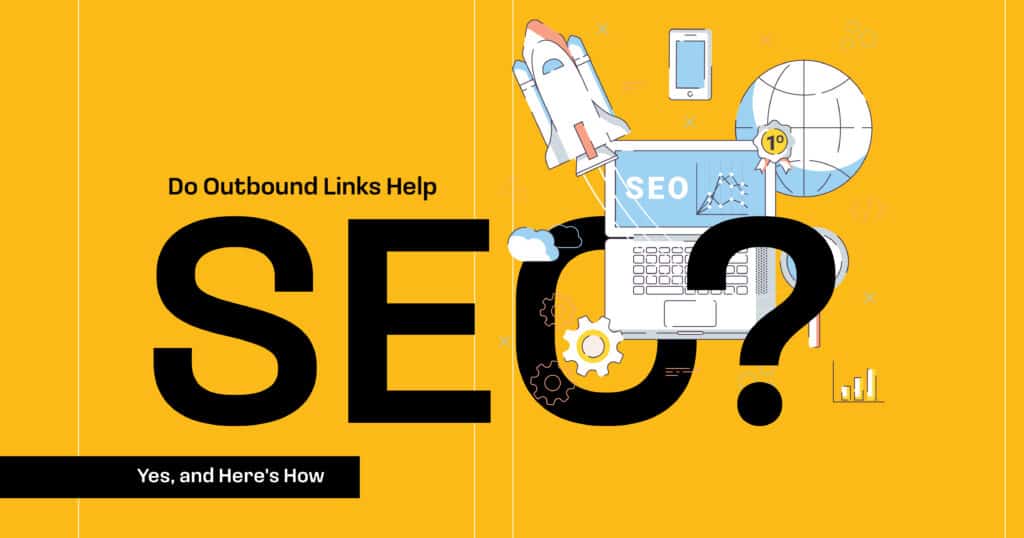You’ve probably heard links are essential to SEO, but what about outbound links?
While most strategies focus on building backlinks to your site, outbound links – those you include in your content pointing to other credible sources – play a surprisingly influential role too. If you’ve ever asked, “Do outbound links help SEO?”, the answer is yes – and the way they help might surprise you.
In this blog, we’ll unpack the value of outbound links, explore how they support keyword relevance, search engine trust, and user experience, and show you how to use them strategically as part of a well-rounded content marketing and link-building plan.
What Are Outbound Links and Why Do They Matter?
Outbound links are hyperlinks that point from your website to another domain. Think of them as digital bridges – connecting your content to reputable sources, further reading, or supporting evidence. While much attention is given to inbound or backlinks, outbound links quietly strengthen your SEO by boosting trust, authority, and contextual relevance. According to Google Search Central, using outbound links to high-quality sources can help users and search engines better understand your content. Similarly, W3C’s HTML documentation explains how outbound links structure the web and guide navigation.
Here’s what outbound links help support:
- Search engine trust – Linking to high-authority sources shows you’re referencing credible information.
- Topical relevance – Outbound links clarify your content’s subject matter to Google’s algorithms.
- User experience – Directing readers to helpful resources adds value and reduces bounce rates.
- Networking and SEO strategy – Linking out can be part of a broader backlink strategy to build relationships and earn links in return.
How Outbound Links Contribute to SEO Ranking Factors
Outbound links may not be a direct ranking signal, but they help search engines better understand your content’s quality and relevance. Linking to authoritative pages shows you’re connected to trustworthy sources and adds value for readers.
Here’s how outbound links support your SEO:
- Help define topical relevance for your content
- Improve credibility by referencing trustworthy sources
- Support anchor text optimization with descriptive linking
- Enhance user experience, guiding readers to helpful resources
- Encourage reciprocal backlinks from sites you reference
The Role of Anchor Text Optimization in External Linking
Anchor text – the clickable words that link to another page – plays a surprisingly important role in SEO. When used thoughtfully, it tells both readers and search engines what to expect from the linked destination. This supports the relevance of your content and strengthens the authority of the site you’re referencing. According to Google’s Search Essentials, effective anchor text improves how search engines interpret your links and understand page relationships.
External links paired with optimized anchor text can provide valuable context, sharpen keyword targeting, and support on-page SEO, without relying on keyword stuffing. To work well, anchor text should feel natural, clearly describe the link’s purpose, and connect seamlessly to the topic it leads to.
Keyword Relevance in Strengthening SEO Signals
The correct anchor text does more than look neat – it helps search engines draw a clearer picture of your page’s topic. Including relevant keywords in your anchor text builds stronger SEO signals, especially when linking to high-authority or contextually related pages.
Here’s a quick comparison of anchor text types and how they affect keyword relevance:
| Anchor Text Type | Example | SEO Impact |
| Exact Match | “Best SEO tools” → SEO tools list | Strong relevance, but can appear spammy if overused |
| Partial Match | “Check out these SEO tips.” | Balanced relevance, more natural feel |
| Branded | “Read more on Moz.” | Good for trust, low keyword relevance |
| Generic | “click here”, “this page” | Low value for SEO; best used sparingly |
| Naked URL | “https://example.com” | Minimal SEO value; sometimes useful in citations |
Link Building With Outbound Strategies: Best Practices
Outbound links don’t just enhance your content – they can also support a broader link-building strategy. When you link to credible, relevant sources, you’re adding value to your readers and opening the door to future relationships with those brands or sites. This can lead to shared visibility, reciprocal backlinks, and even collaborative content opportunities.

Done thoughtfully, outbound linking can improve both your SEO authority and your position within your niche. But it has to be strategic, not spammy.
Here’s how to make outbound links work as part of your link-building strategy:
- Link to high-authority, trustworthy websites in your niche.
- Use descriptive, keyword-relevant anchor text that adds clarity.
- Avoid linking excessively – only include outbound links where they offer real value.
- Don’t link to low-quality, thin, or unrelated content (this can hurt your credibility).
- Reach out to sources you mention – they may link back or share your content.
- Regularly audit your outbound links to ensure they’re still live and relevant.
Boosting Search Engine Visibility Through Content Marketing
The best outbound strategies live inside great content. High-quality, helpful content earns links naturally, and when paired with outbound links to relevant resources, it signals to search engines that your page is well-researched, connected, and useful.
Content marketing becomes even more powerful when it’s part of a linking ecosystem. By linking out to valuable sources, you support your narrative while aligning your site with other respected content in your space.
Here’s how content marketing and outbound linking combine to enhance SEO:
- Educational blog posts with outbound references improve topical depth
- Linking to industry reports, studies, or data builds trust with both readers and Google
- Guides and how-to articles that reference tools or resources can drive user engagement and backlink potential
- Strategically placed outbound links show that your content is connected to a broader digital conversation
Let BloomHouse Marketing Optimize Your Backlink Strategy
Outbound links are often underestimated, but when used strategically, they can elevate your entire SEO game. At BloomHouse Marketing, we help brands build smarter content, better link structures, and lasting authority online. From anchor text audits to outbound link strategy, we ensure every link adds real value for users and search engines.
Ready to take your backlink strategy to the next level? Contact BloomHouse Marketing today and let’s strengthen your SEO from the inside out.

FAQs
How does using outbound links in your backlink strategy contribute to improved SEO ranking factors?
Outbound links help establish trust, relevance, and authority in your content. When you link to credible sources, search engines see your page as part of a reliable, topic-specific web ecosystem.
What is the importance of anchor text optimization when implementing external linking for better search engine visibility?
Well-optimized anchor text helps users and search engines understand the context of a link. It reinforces keyword relevance and improves clarity in how your content connects to the page you’re linking to.
How does keyword relevance affect the effectiveness of outbound links within content marketing?
Outbound links strengthen topical signals when they use keyword-relevant anchor text and connect to related topics. This improves SEO and helps search engines better categorize your content.
What are some best practices for link building through strategic outbound links to enhance SEO performance?
Link to high-authority sources, use descriptive anchor text, and only link where it adds actual value. Reaching out to sources you mention can also encourage backlinks and networking opportunities.
How can outbound links improve search engine visibility and overall SEO strategy?
They show search engines that your content is trustworthy, well-researched, and contextually connected. This improves your credibility, enhances crawlability, and supports overall ranking efforts.









